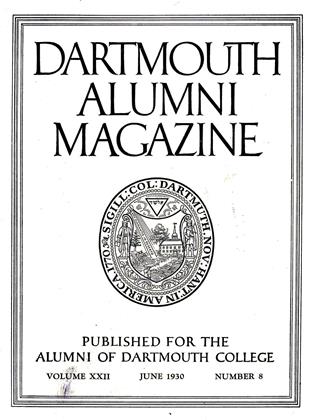By Willard Connely '11. New York. Charles Scribner's Sons.
Mr. Connely's intention is the fairly common one among contemporary biographers— to take a lively figure and construct out of the firm materials of scholarship a portrait pleasing to both scholars and populace. Wycherley is undoubtedly a promising subject: a wit, a spendthrift, a gallant, the writer of probably the least decent plays in English, and, at the end, a pathetic, disappointed, broken-minded, debt-harassed victim of his past. Born to wealth, with good looks, strength, brilliance, and superabundant charm, Wycherley became, according to Mr. Connely's subtitle, "First Master of Modern English Comedy." With his gifts, surely, that is what he might have become, but it may be doubted that he did. Was he really greater than Etherege, who, after all, made the break with the post-Elizabethan comic tradition?
But the book is absorbing, thoroughly documented, active, well-written. Mr. Connely is. enthusiastic about Wycherley, and about that strange, candid, well-dressed, illliving period of the Restoration, when England was ruled by fops and nymphomaniacs. He gives us his people in phrases of sometimes quite extraordinary sharpness and vividness, and he makes us feel the pressures on them of the queer manners of their times. Of course, he makes the most of Wycherley's love affairs, especially with the shameless Barbara Villiers-Palmer-Castlemaine-Cleveland, mistress of a king and an acrobat, whom Mr. Connely treats with a mixture of amusement and brutality. And he deals clearly with the involved business of the relations between Wycherley and Pope, about which we will never have more than qualified truth. His regard for his subject leads him, perhaps wisely, to omit mention of Pope's charge that Wycherley antedated his writings to prove precocity, but that omission is unimportant, probably. I do wish he might have held his curtain for a moment to dispose of Elizabeth Jackson, Wycherley's death-bed wife, whose parting from her husband comes on one of Wycherley's neatest lines. But all in all, Brawny Wycherley is complete enough.
I can't help feeling, however, that Mr. Connely is a little too detached from the moral values of his hero and his story. Wycherley himself seems to have had some moral fervor, to have felt the conflict between the ideal and the actual, to have been something more than a brilliant loose-liver who could write. And his career, in its entirety, becomes something remarkably like a parable. I do not ask that sermons be preached on Wycherley or the Restoration as text, though that, no doubt, is what I should unwisely do myself; I ask only that my writers of biography show awareness of the possible sermons. As Mr. Connely does Wy- cherley, he is always of the particular, never of the general, and I think he loses signifi- cance thereby. He becomes remote and dis- embodied, a shadow man who passes and deserves forgetting. But this, I understand, is Mr. Connely's first biography, and as such I think it praiseworthy indeed. I am looking forward to his book on Steele.
 View Full Issue
View Full Issue
More From This Issue
-
 Article
ArticleAlumni Associations
June 1930 -
 Article
ArticleThe Dartmouth Indians
June 1930 By Leon B. Richardson -
 Article
ArticleThe Use of Leisure
June 1930 By Nelson A. Rockefeller -
 Article
ArticleA Student on His Own
June 1930 By H. S. Embree -
 Article
ArticleTrustee Meeting
June 1930 -
 Lettter from the Editor
Lettter from the EditorEditorial Comment
June 1930
Books
-
 Books
BooksAlbert W. Levi '32, is the author
December 1933 -
 Books
BooksFaculty Articles
October 1956 -
 Books
BooksCOMMUNITY COLLEGES, A PRESIDENT'S VIEW.
November 1968 By ALEXANDER FANELLI '42 -
 Books
BooksTHE CUBAN FISCAL SYSTEM,
February 1940 By J. M. McDaniel -
 Books
BooksDone or Left Undone
December 1976 By JOHN S. MAJOR -
 Books
BooksSEAT OF EMPIRE: THE POLITICAL ROLE OF EIGHTEENTH-CENTURY WILLIAMSBURG
February 1951 By Wayne E. Stevens

